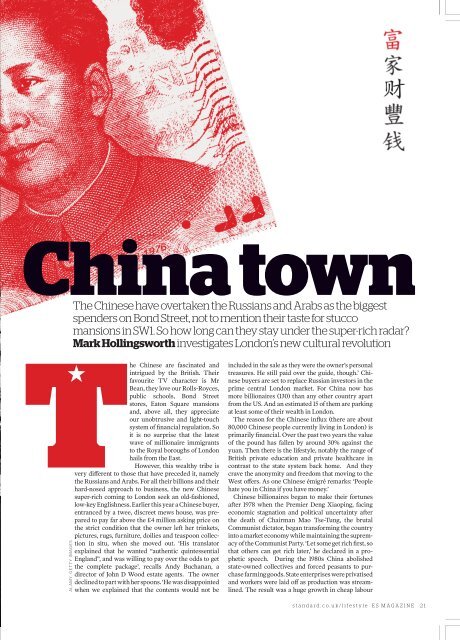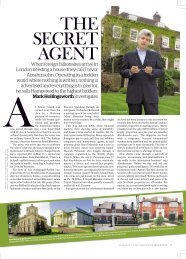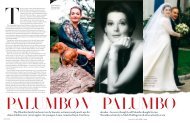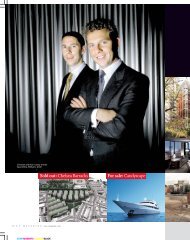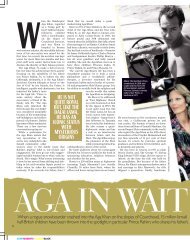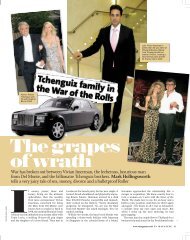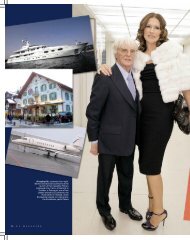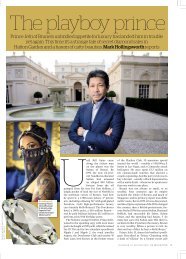20 ES MAGAZINE standard.co.uk/lifestyle - Mark Hollingsworth
20 ES MAGAZINE standard.co.uk/lifestyle - Mark Hollingsworth
20 ES MAGAZINE standard.co.uk/lifestyle - Mark Hollingsworth
Create successful ePaper yourself
Turn your PDF publications into a flip-book with our unique Google optimized e-Paper software.
China town<br />
The Chinese have overtaken the Russians and Arabs as the biggest<br />
spenders on Bond Street, not to mention their taste for stuc<strong>co</strong><br />
mansions in SW1. So how long can they stay under the super-rich radar?<br />
<strong>Mark</strong> <strong>Hollingsworth</strong> investigates London’s new cultural revolution<br />
T<br />
he Chinese are fascinated and<br />
intrigued by the British. Their<br />
favourite TV character is Mr<br />
Bean, they love our Rolls-Royces,<br />
public schools, Bond Street<br />
stores, Eaton Square mansions<br />
and, above all, they appreciate<br />
our unobtrusive and light-touch<br />
system of fi nancial regulation. So<br />
it is no surprise that the latest<br />
wave of millionaire immigrants<br />
to the Royal boroughs of London<br />
hails from the East.<br />
However, this wealthy tribe is<br />
very di erent to those that have preceded it, namely<br />
the Russians and Arabs. For all their billions and their<br />
hard-nosed approach to business, the new Chinese<br />
super-rich <strong>co</strong>ming to London seek an old-fashioned,<br />
low-key Englishness. Earlier this year a Chinese buyer,<br />
entranced by a twee, discreet mews house, was prepared<br />
to pay far above the £4 million asking price on<br />
the strict <strong>co</strong>ndition that the owner left her trinkets,<br />
pictures, rugs, furniture, doilies and teaspoon <strong>co</strong>llection<br />
in situ, when she moved out. ‘His translator<br />
explained that he wanted “authentic quintessential<br />
England”, and was willing to pay over the odds to get<br />
the <strong>co</strong>mplete package’, recalls Andy Buchanan, a<br />
director of John D Wood estate agents. The owner<br />
declined to part with her spoons. ‘He was disappointed<br />
when we explained that the <strong>co</strong>ntents would not be<br />
AL AMY. GE T T Y IMAGE S ★<br />
included in the sale as they were the owner’s personal<br />
treasures. He still paid over the guide, though.’ Chinese<br />
buyers are set to replace Russian investors in the<br />
prime central London market. For China now has<br />
more billionaires (130) than any other <strong>co</strong>untry apart<br />
from the US. And an estimated 15 of them are parking<br />
at least some of their wealth in London.<br />
The reason for the Chinese infl ux (there are about<br />
80,000 Chinese people currently living in London) is<br />
primarily fi nancial. Over the past two years the value<br />
of the pound has fallen by around 30% against the<br />
yuan. Then there is the <strong>lifestyle</strong>, notably the range of<br />
British private education and private healthcare in<br />
<strong>co</strong>ntrast to the state system back home. And they<br />
crave the anonymity and freedom that moving to the<br />
West o ers. As one Chinese émigré remarks: ‘People<br />
hate you in China if you have money.’<br />
Chinese billionaires began to make their fortunes<br />
after 1978 when the Premier Deng Xiaoping, facing<br />
e<strong>co</strong>nomic stagnation and political uncertainty after<br />
the death of Chairman Mao Tse-Tung, the brutal<br />
Communist dictator, began transforming the <strong>co</strong>untry<br />
into a market e<strong>co</strong>nomy while maintaining the supremacy<br />
of the Communist Party. ‘Let some get rich fi rst, so<br />
that others can get rich later,’ he declared in a prophetic<br />
speech. During the 1980s China abolished<br />
state-owned <strong>co</strong>llectives and forced peasants to purchase<br />
farming goods. State enterprises were privatised<br />
and workers were laid o as production was streamlined.<br />
The result was a huge growth in cheap labour<br />
s t a n d a r d . c o . u k / l i f e s t y l e E S M A G A Z I N E 2 1


